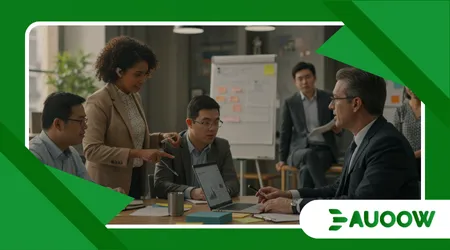Why Mentorship Is Essential for Entrepreneurs with Disabilities

Mentorship is essential for entrepreneurs with disabilities, offering a lifeline to navigate unique challenges and unlock opportunities in the competitive entrepreneurial landscape.
Starting a business is a bold endeavor for anyone, but for individuals with disabilities, the journey often involves additional hurdles physical, societal, and systemic.
These barriers, ranging from inaccessible workspaces to biased perceptions, can feel insurmountable without guidance. Yet, with the right mentor, entrepreneurs with disabilities can transform obstacles into stepping stones, leveraging their resilience and unique perspectives to thrive.
This article explores why mentorship is not just helpful but critical for their success, delving into practical benefits, real-world examples, and actionable insights.
By fostering confidence, providing tailored strategies, and building inclusive networks, mentorship empowers these entrepreneurs to redefine success on their own terms.
The entrepreneurial world in 2025 is more inclusive than ever, yet gaps remain. According to a 2022 Deque survey, 73% of accessibility professionals noted increased digital accessibility awareness during the pandemic, highlighting the growing need for inclusive business practices.
Mentorship bridges this gap by offering personalized support that addresses both business and disability-specific challenges.
Unlike generic advice, mentors provide a roadmap tailored to the entrepreneur’s unique needs, whether it’s navigating adaptive technologies or overcoming societal stigma.
This article will unpack the multifaceted role of mentorship, offering a fresh perspective on how it fuels empowerment, fosters resilience, and drives economic inclusion for entrepreneurs with disabilities.
Breaking Barriers Through Guidance
Entrepreneurs with disabilities face barriers that demand more than grit to overcome. Mentorship is essential for entrepreneurs with disabilities because it provides tailored strategies to dismantle these obstacles.
Physical inaccessibility, like non-navigable offices, or digital barriers, such as websites lacking screen reader compatibility, can hinder progress.
A mentor who understands these challenges offers practical solutions, like recommending accessible tools or advocating for inclusive design.
Take Sarah, a visually impaired entrepreneur launching a tech startup in 2024. Her mentor, a seasoned business owner with low vision, introduced her to screen reader-compatible CRM software, streamlining client interactions.
++ How to Build a Fully Accessible Online Store from Scratch
This guidance saved Sarah months of trial and error, proving mentorship’s value in navigating disability-specific hurdles. Without such support, entrepreneurs risk burnout or failure.
Mentors also help combat societal biases that undermine confidence. By sharing their own stories of overcoming prejudice, they inspire mentees to persevere.
For instance, a mentor might guide an entrepreneur to address accessibility in their business plan, ensuring long-term viability and inclusivity.

Building Confidence and Skills
Confidence is the cornerstone of entrepreneurial success, yet disability-related challenges can erode it. Mentorship is essential for entrepreneurs with disabilities as it fosters self-assurance and hones critical skills.
Mentors create safe spaces for mentees to explore their potential, offering constructive feedback that builds resilience. They guide entrepreneurs in mastering leadership, negotiation, and problem-solving, tailored to their unique circumstances.
Consider James, a paraplegic entrepreneur running an e-commerce consultancy. His mentor, a former CEO with a mobility impairment, coached him on using voice-to-text tools to manage workflows efficiently.
Also read: Grants and Funding Opportunities for Disability-Led Startups in 2025
This not only boosted James’s productivity but also his belief in his capabilities, transforming his business approach.
Skill development extends beyond technical expertise. Mentors help entrepreneurs navigate emotional challenges, like self-doubt, by sharing personal triumphs.
They encourage calculated risks, pushing mentees to step outside comfort zones, which is vital for growth in a competitive market.
Mentorship also sharpens strategic thinking. By analyzing market trends together, mentors help entrepreneurs with disabilities align their ventures with current demands, ensuring relevance and sustainability.
This hands-on guidance builds a foundation for long-term success, rooted in confidence and competence.
Overcoming Unique Entrepreneurial Challenges
The entrepreneurial path is fraught with challenges, but for those with disabilities, these are amplified by accessibility issues and discrimination.
Mentorship is essential for entrepreneurs with disabilities because it equips them to tackle these unique obstacles head-on. Mentors provide problem-solving strategies, from securing accessible funding to addressing workplace biases.
For example, a 2023 study by Disability:IN found that 62% of entrepreneurs with disabilities reported difficulty accessing traditional funding due to biased lender perceptions.
A mentor can guide them toward disability-specific grants or crowdfunding platforms, like those offered by the Office of Disability Employment Policy. This practical advice turns barriers into opportunities.
Mentors also foster accountability, encouraging entrepreneurs to face fears and take bold steps. By sharing stories of overcoming adversity, they instill resilience.
Read more: Inclusive Leadership: How Disabled Entrepreneurs Are Changing Business Culture
A mentor might help an entrepreneur with autism navigate sensory overload during networking events, suggesting virtual alternatives or sensory-friendly strategies.
Additionally, mentors provide emotional support, helping entrepreneurs manage the stress of balancing disability-related needs with business demands.
This holistic guidance ensures they remain focused and motivated, turning challenges into growth opportunities.
Fostering Inclusive Networks and Opportunities
Entrepreneurship thrives on connections, but building networks can be daunting for those with disabilities.
Mentorship is essential for entrepreneurs with disabilities because it opens doors to inclusive networks and opportunities.
Mentors introduce mentees to disability-focused organizations, investors, and peers, creating a supportive ecosystem.
Take Maria, a deaf entrepreneur launching a social enterprise in 2025. Her mentor connected her to a disability-inclusive business summit, where she met investors who valued her vision. This network expanded her reach, securing partnerships that fueled her venture’s growth.
Mentors also advocate for accessibility in professional spaces, ensuring entrepreneurs can participate fully.
They might recommend platforms like LinkedIn, which offers accessibility features, to build connections remotely. This inclusivity amplifies visibility and collaboration.
By fostering a sense of community, mentors help entrepreneurs feel less isolated. They facilitate peer-to-peer learning, where entrepreneurs with disabilities share insights and resources, strengthening their collective impact in the market.
Measuring Success and Long-Term Impact
Success for entrepreneurs with disabilities goes beyond profit it encompasses personal growth and societal impact.
Mentorship is essential for entrepreneurs with disabilities because it provides a framework to measure and achieve meaningful outcomes. Mentors help set clear, achievable goals, from revenue targets to skill milestones, ensuring progress is trackable.
For instance, a mentor might guide an entrepreneur to use analytics tools like Google Search Console to monitor website performance, aligning with business objectives.
This data-driven approach validates efforts and highlights areas for improvement. Success metrics also include confidence gains and network expansion, which are critical for sustained growth.
Mentors nurture long-term relationships, adapting guidance as businesses evolve. Regular check-ins ensure entrepreneurs stay on track, adjusting strategies to meet changing market demands. This ongoing support transforms short-term wins into lasting impact, redefining success.
The ripple effect of mentorship extends to society. By empowering entrepreneurs with disabilities, mentors contribute to a more inclusive economy, challenging stereotypes and fostering diversity. This long-term impact creates a legacy of empowerment and opportunity.
The Role of Technology in Mentorship

Technology plays a pivotal role in making mentorship accessible and effective for entrepreneurs with disabilities.
Mentorship is essential for entrepreneurs with disabilities because it leverages tools like screen readers, voice-to-text software, and virtual platforms to bridge gaps. These technologies enable seamless communication, regardless of physical or sensory limitations.
For example, Zoom’s closed-captioning feature allows deaf entrepreneurs to engage in mentorship sessions effortlessly.
Mentors can recommend tools like Dragon NaturallySpeaking to streamline tasks for those with mobility challenges, enhancing productivity. This tech-driven approach ensures mentorship is inclusive and practical.
Online platforms also expand access to mentorship programs. Organizations like Disability:IN offer virtual mentorship initiatives, connecting entrepreneurs with experienced guides worldwide.
This global reach empowers entrepreneurs to learn from diverse perspectives, enriching their strategies.
Moreover, technology facilitates ongoing learning. Mentors can share accessible resources, like braille-compatible business guides or audio-based courses, ensuring entrepreneurs stay informed.
By integrating technology, mentorship becomes a dynamic tool for empowerment, breaking down traditional barriers.
Table: Key Benefits of Mentorship for Entrepreneurs with Disabilities
| Benefit | Description | Example |
|---|---|---|
| Tailored Guidance | Strategies addressing disability-specific challenges | Recommending screen readers for visually impaired entrepreneurs |
| Confidence Building | Emotional and professional support to boost self-assurance | Coaching on overcoming societal biases |
| Network Expansion | Access to inclusive business communities and opportunities | Connecting to disability-focused summits or investors |
| Skill Development | Training in leadership, negotiation, and market analysis | Teaching accessible marketing strategies for e-commerce |
| Technology Integration | Use of adaptive tools to enhance productivity and communication | Using voice-to-text software for efficient workflow management |
Conclusion
Mentorship is the cornerstone of entrepreneurial success for individuals with disabilities, transforming barriers into opportunities and fostering resilience in a competitive world.
Mentorship is essential for entrepreneurs with disabilities because it provides more than advice it offers a tailored roadmap to navigate unique challenges, build confidence, and access inclusive networks.
From guiding Sarah to accessible CRM tools to helping James streamline his consultancy, mentorship delivers practical, life-changing impact. Why settle for isolation when a mentor can unlock your potential?
In 2025, as digital accessibility awareness grows, mentorship remains a vital force in creating an equitable entrepreneurial landscape.
By empowering entrepreneurs with disabilities, mentors not only fuel individual success but also drive societal change, proving that diversity is a strength. Embrace mentorship, and let it guide you to redefine what’s possible.
Think of mentorship as a lighthouse, guiding ships through stormy seas. For entrepreneurs with disabilities, it illuminates the path, ensuring they reach their destination stronger and wiser.
The journey may be tough, but with a mentor’s guidance, every entrepreneur can navigate the waves and build a legacy of impact.
Frequently Asked Questions
Q: How can entrepreneurs with disabilities find the right mentor?
A: Seek mentors through disability-focused organizations like Disability:IN, leverage LinkedIn for networking, and clarify your goals to ensure compatibility.
Q: What makes mentorship different for entrepreneurs with disabilities?
A: It addresses unique barriers like accessibility and bias, offering tailored strategies, adaptive tools, and emotional support to foster inclusive success.
Q: Are there specific mentorship programs for entrepreneurs with disabilities?
A: Yes, programs like the Entrepreneurs with Disabilities Program (EDP) offer one-on-one mentoring, focusing on business planning and accessibility.
Q: How does technology enhance mentorship for entrepreneurs with disabilities?
A: Tools like screen readers, voice-to-text software, and virtual platforms ensure accessible communication, enabling seamless mentorship regardless of limitations.
Q: Can mentorship help with funding challenges for entrepreneurs with disabilities?
A: Absolutely. Mentors guide entrepreneurs to disability-specific grants, crowdfunding platforms, and accessible funding options, overcoming biased lender perceptions.
